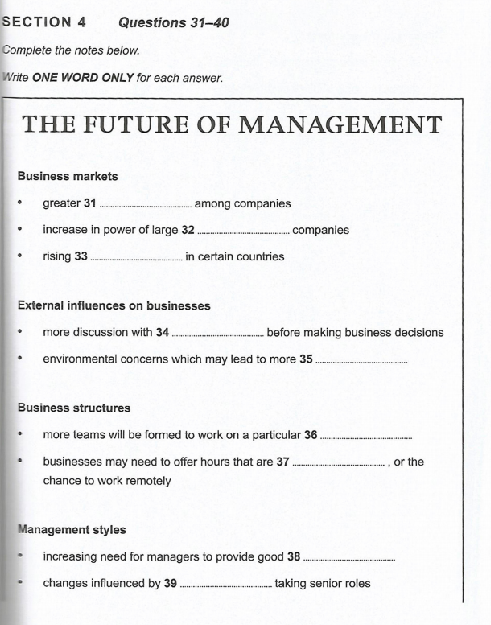剑桥雅思10听力:Test2雅思听力Section4解析
发布时间:2021-02-23 关键词:Section4
Today we’re going to look at an important area of science, namely nanotechnology.
So what is it?
Nano means tiny, so it's science and engineering on the scale of atoms and molecules.
The idea is that by controlling and rearranging atoms, you can literally create anything.
However, as we'll see, the science of the small has some big implications affecting us in many ways.
There's no doubt that nanotechnology promises so much for civilisation.
However, all new technologies have their teething problems.
And with nanotechnology, society often gets the wrong idea about its capabilities.
Numerous science-fiction books and movies have raised people's fears about nanotechnology - with scenarios such as inserting little nano-robots into your body that monitor everything you do without you realising it, or self-replicating nano-robots that eventually take over the world.
So how do we safeguard such a potentially powerful technology?
Some scientists recommend that nano-particles be treated as new chemicals with separate safety tests and dear labelling.
They believe that greater care should also be taken with nano-particles in laboratories and factories.
Others have called for a withdrawal of new nano products such as cosmetics and a temporary halt to many kinds of nanotech research.
But as far as I'm concerned there's a need to plough ahead with the discoveries and applications of nanotechnology.
I really believe that most scientists would welcome a way to guard against unethical uses of such technology.
We can't go around thinking that all innovation is bad, all advancement is bad.
As with the debate about any new technology, it is how you use it that's important.
So let's look at some of its possible uses.
Thanks to nanotechnology, there could be a major breakthrough in the field of transportation with the production of more durable metals.
These could be virtually unbreakable, lighter and much more pliable leading to planes that are 50 times lighter than at present.
Those same improved capabilities will dramatically reduce the cost of travelling into space making it more accessible to ordinary people and opening up a totally new holiday destination.
In terms of technology, the computer industry will be able to shrinkcomputer parts down to minute sizes.
We need nanotechnology in order to create a new generation of computers that will work even faster and will have a million times more memory but will be about the size of a sugar cube.
Nanotechnology could also revolutionise the way that we generate power.
The cost of solar cells will be drastically reduced so harnessing this energy will be far more economical than at present.
But nanotechnology has much wider applications than this and could have an enormous impact on our environment.
For instance, tiny airborne nano-robots could be programmed to actually rebuild the ozone layer, which could lessen the impact of global warming on our planet.
That's a pretty amazing thought, isn't it?
On a more local scale, this new technology could help with the clean-up of environmental disasters as nanotechnology will allow us to remove oil and other contaminants from the water far more effectively.
And, if nanotechnology progresses as expected —as a sort of building block set of about 90 atoms—then you could build anything you wanted from the bottom up.
In terms of production, this means that you only use what you need and so there wouldn't be any waste.
The notion that you could create anything at all has major implications for our health.
It means that we'll eventually be able to replicate anything.
This would have a phenomenal effect on our society.
In time it could even lead to the eradication of famine through the introduction of machines that produce food to feed the hungry.
But it's in the area of medicine that nanotechnology may have its biggest impact.
How we detect disease will change as tiny biosensors are developed to analyse tests in minutes rather than days.
There's even speculation nano-robots could be used to slow the ageing process, lengthening life expectancy.
As you can see, I'm very excited by the implications that could be available to us in the next few decades.
Just how long it'll take, I honestly don't know.


Question 31
答案: C
定位:判断题目中的关键词为 problem,选项中的关键词为 A. threaten、B. spy 以及 C. misunderstood。
解析:录音中说到所有新的技术都有 teething problems (事情开始时的暂时问题),对于纳米技术(with nanotechnology),问题则是“...gets the wrong idea about...与选项当中的 be misunderstood 为同义转换。所以 C 选项是正确的。
Question 32
答案: B
定位:判断题目中的关键词为 nano-particles,选项当中的关键词为 A. restricted、B. more caution 以及 C. essential products。
解析:录音中科学家 recommend (介绍),纳米颗粒必须作为新的化学物质 be treated as (被对待),并且要经过 safety tests (安全测试)以及清楚的 labelling (标记)。 Recommend 相当于题目当中的 believe,测试以及标记都表明了 caution (谨慎)的态度。所以 B 选项是正确的。
Question 33
答案:C
定位:判断题目当中的关键词为 research,选项当中的关键词为 A. yet to (还没)、win support、 B. unethical 和 C continued。
解析:录音中提到 “ ...need to plough ahead ( 向 前 开 路 )with the discoveries and applications”,此句中 the discoveries and applications 相当于题目中的 research,plough ahead 意思与 be continued 相近。因此 C 选项是正确的。
Question 34
答案:metal/metals
定位:判断题目中的关键词为 stronger。
解析: 录音中说到“Thanks to nanotechnology,...with the production of more durable metals”,这里的 more durable 就相当于题目中的 stronger,所以正确答案为 metal,此题难度较小。
Question 35
答案:space
定位:题目当中的关键词为 travel 以及 the masses。
解析: 录音中提到 “travelling into the space... to ordinary people...” 此句中的 ordinary people 就 相当于题目当中的 the masses,另外录音当中的 accessible 等同于题目当中的 available。因此本题 的正确答案为 space。
Question 36
答案:memory
定位:判断题目的关键词为 computer、smaller、faster 以及 greater。
解析:录音中依次提到电脑将会 down to minute size, work even faster,以及 a million times more memory,与题目中的 smaller、faster 以及 greater 对应,因此该空应填写 memory。
Question 37
答案:solar
定位:判断题目当中的关键词为 energy 以及 more affordable。
解析:录音中提到 “the cost of solar cell will be…reduced..,harnessing this energy... more economical...”其中的 economical 与题目当中的 affordable 是对应关系,显然 this energy 指的就是 solar energy。
Question 38
答案:oil
定位:判断题目当中的关键词为 pollutants、remove 以及 from water。
解析:录音中提及“remove oil and other contaminants from the water...”其中 contaminants 和题目当中的 pollutants 是同义转换。所以此题应填写 oil,较为简单。
Question 39
答案:waste
定位:判断题目中的关键词为 no 以及 manufacturing。
解析:录音当中提到“in terms of production,…wouldn't be any waste.”这里的 production 与 manufacturing 是同义转换。此题难度较小。
Question 40
答案:tests
定位:判断题目当中的关键词为 medical 以及 speedup。
解析:录音中提到“…to analyse tests in minutes rather than days”,与题目对应,时间由数天减少为几分钟,意思是加速了(speed up),此句中的 analyse 是题目中的 analysis 的动词形式。本题难度适中。




